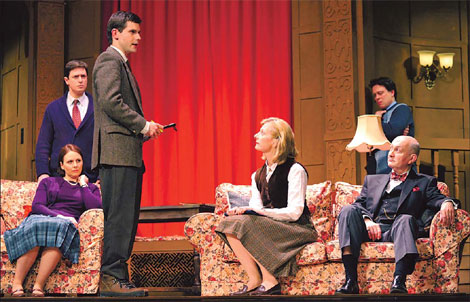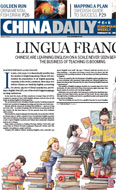Society
Revealing theater's mysteries
Updated: 2011-02-22 07:54
By Zhang Kun (China Daily)
|
The original English-language production of The Mousetrap was performed in Shanghai in 2010. provided to China Daily |
The works of detective writer Agatha Christie boost Shanghai's theater scene. Zhang Kun reports.
When Tong Xin and his classmates chose The Mousetrap for their graduation project and staged the play in Shanghai Theater Academy in 2003, it never crossed his mind that his relationship with British mystery writer Agatha Christie (1890-1976) would last much longer.
Oh, but it has.
Since becoming head of The Mousetrap Theater Studio, Tong has produced five plays by Christie and plans on introducing many more.
And he's not the only theater producer to focus on the English crime writer's works in Shanghai.
Zhang Yu and his Xiandairen Theater Studio are also working on Chinese productions of Christie's plays.
Zhang also managed to introduce the original English-language production of The Mousetrap in Shanghai in January 2010. It was the first time the play, which premiered in London in 1952, was performed abroad. The Mousetrap has been performed more than 24,000 times to date and is the longest running show of any genre in modern times.
Thanks to Sir Stephen Waley-Cohen, who produced the original shows of The Mousetrap, Xiandairen acquired exclusive copyrights to produce the Mandarin versions of the play for nine consecutive years.
Other works by Christie Xiandairen has produced are: Spider's Web, Appointment With Death, Black Coffee, A Murder is Announced and Towards Zero. "We'll continue introducing new plays every year," Zhang says.
Xiandairen will stage a new performance of the Chinese version of The Mousetrap every year, using the English-language production's original settings and stage designs.
"The language will be different, but the style and quality will remain consistent with the original," Zhang says.
Although Tong's studio lost the Chinese copyright of the play in 2010, it has other ways in which it will remain involved with Christie's works.
"We plan to inaugurate an annual festival dedicated to Christie in December, when we'll stage four or five of her plays in a short time," Tong says.
When the festival becomes a regular event, he will introduce original versions of her plays to be presented along with his Chinese-language productions.
Some of the shows Tong's group has produced are Christie's, such as And Then There Were None, The Unexpected Guest and The Hollow.
The studio has also performed works by other mystery authors, such as Anthony Shaffer's Tony Award-winning work, Sleuth.
"We will continue making new productions of Christie's mysteries, and we'll hopefully produce a new show every December," Tong says.
Other plays by Christie that his studio plans to stage in Chinese include Go Back for Murder, Five Little Pigs and Witness for the Prosecution.
Shanghai's performance arts market was heavily hit by the SARS epidemic in 2003. To draw audiences after the crisis, Yu Rongjun, then artistic director of the Shanghai Drama Arts Center, invited the performance of The Mousetrap.
It was a hit with local audiences.
Tong and his classmates staged a new round of the production every year until 2007, when Tong decided to turn the performances into serious business.
"We purchased the copyright from Christie's agent and established our own company, which we named after our first production," he says.
"I didn't know much about Christie except for what I've learned from some old movies, such as Death on the Nile and Murder on the Orient Express," Tong says.
Those movies, both adapted from Christie's novels featuring Belgian detective Hercule Poirot, were shown in Chinese in the early 1980s and made Poirot a household name among the country's movie-goers.
Tong says he later learned more about Christie. "Her plays have perfect structures and interesting characters," he says.
"She wrote most of her novels and plays in the 1950s, when the English were going through a difficult time right after World War II. There were some very dramatic situations that are still highly relevant today."
Chinese audiences are more attracted to the plotline than to other elements of theater, compared to audiences in the more mature Western theater markets, Tong believes.
"They want an intriguing mystery to take them out of the daily routines. Then, they will think about the characters, theatrical conflicts and so on. That's why Christie has remained popular with China's theater-goers."
E-paper

Lingua franca
Chinese are learning English on a scale never seen before and the business of teaching is booming.
Golden run ahead
Looking abroad
Mapping out a plan
Specials

Sentimental journey
Prince William and Kate Middleton returned to the place where they met and fell in love.

Rent your own island
Zhejiang Province charts plans to lease coastal islands for private investments

Self-made aircraft
An automobile mechanic in Northeast China made a test flight of his self-made aircraft which cost about US$395.

